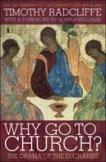Three-part harmony
Is there a reason beyond obligation for going to church? For Timothy Radcliffe, O.P., former master general of the Dominican order, we go to church to receive a gift—a share in God’s life through faith, hope and love; and to be sent forth to live by what we have received.
The major thesis of this book is that the Eucharist enacts the drama of what it means to be alive, for the dramatic structure of the Eucharist is the fundamental pattern of every human life searching for God. A subtext of this thesis is that participating in the Eucharist forms us as a people who believe, hope and love and so transforms the way we see the world and belong to each other. The spiritual practice of going to church, Radcliffe maintains, works on us so quietly and gradually that we might think nothing is happening to us at the Eucharist.
To illustrate his thesis, Radcliffe divides the eucharistic drama into three acts. Act I, from the confession of sins to the prayers of intercession, expresses our faith: Through faith we know the goal of human life—namely, happiness with God. Act II, from the preparation of gifts to the end of the eucharistic prayer, gives us hope to reach this goal. In Act III, from the Our Father onward, our hope culminates in our loving communion with God and with one another.
The book’s literary form is hard to nail down. The author does not develop his thesis in the form of a discursive argument that would lay out a theology of the Eucharist, though he treats various interpretations of the meaning of the Eucharist. Nor is this book an exercise in apologetics that would appeal to those who lack a fundamental commitment to the Eucharist and do not go to church. Radcliffe writes as a believer, for believers. This is especially evident in the way he uses various biblical stories to explain what believers do and think about the various parts of the Mass. Liturgists will not find here any commentary on the parts of the Mass, though the reflections on the confession of sins, the homily and the greeting of peace, for example, certainly inspire creative thinking on how to express the spirit of these parts.
Why Go to Church? is a mix of Eucharistic theology, commentary and spiritual reflection stimulated by the various parts of the Mass. Overall, it is more an extended meditation than a theological treatise. It shows the subtle art of a seasoned preacher who knows how to invite his audience into the happenings of grace by telling a story, reciting a poem, relating an experience or making a point with humor or a well-chosen quote. In this way, the book shows that those who may have a problem with going to church may really be facing a crisis in their language of faith. When we try to talk about God, where do we find the right words that are neither sentimental nor moralistic? Radcliffe finds them less in the words of classic theology and more in the words of modern novels, films and poetry.
The subtext of this book, that participating in the Eucharist is transformative, requires a note of caution: there is no guarantee that if we go to church we will acquire the virtues of the eucharistic drama. If we claim too much for the transforming potential of going to church, we risk creating a theological version of “Field of Dreams.” In the film by this title, the motivation to build the baseball field is the advice, “If you build it, they will come.” The theological version would be, “If you go to church, you will be transformed.”
But the link is not so automatic. The connections between the Eucharist and the virtuous life are complex, not simple. While participating in the Eucharist may give us a new way of seeing the world (a theme that Radcliffe repeats frequently), it takes the habit of moral practice to implement our new vision. Spiritual practices are not the way to acquire virtue. Graham Greene’s novel A Burnt-Out Case provides a good example of how our moral practices can outrun our spiritual ones. In Greene’s story, Querry, who has not been to Mass for more than 20 years, and Dr. Colin, who has lost his faith in any God the priests and sisters who run the leprosarium would be able to recognize, are the greater moral models of humility and unselfishness. We misunderstand our freedom and our finitude, along with the multiple influences on our character, if we think that there is an easy and sure connection between going to church and being virtuous.
Given this caution, Radcliffe’s meditation on the Eucharist can be inspiring reading for preachers and teachers. His interpretations of the confession of sins, intercessory prayers, the role of the doctrines in the Creed, the eucharistic prayer, the sign of peace and the dismissal inform a eucharistic spirituality that can nourish moral conversion by giving us not only a new way of seeing the world but also a new way of being in the world. The great difference between the vision of life enacted in the Eucharist and what we experience in life tells us how much we are in need of conversion personally, socially and institutionally.
This article also appeared in print, under the headline “Three-part harmony,” in the February 23, 2009, issue.








